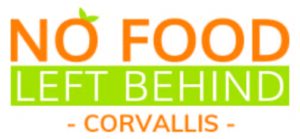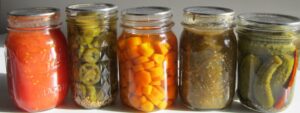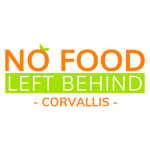No Food Left Behind offers amazing resources!
 We’re pleased to announce the launch of a new project to prevent wasted food. No Food Left Behind–Corvallis aims to raise awareness about the magnitude of the problem of wasted food and to help community members find simple and effective ways to address it. Funded by a generous grant from the Oregon Department of Environmental Quality.
We’re pleased to announce the launch of a new project to prevent wasted food. No Food Left Behind–Corvallis aims to raise awareness about the magnitude of the problem of wasted food and to help community members find simple and effective ways to address it. Funded by a generous grant from the Oregon Department of Environmental Quality.
Did you know that 40% of the food grown in the US is never eaten?
“The impacts of this are staggering,” explains Project Manager Jeanette Hardison, who is also co-leader of the Coalition’s Waste Prevention Action Team. “Globally, if food waste were a country, it would be the third largest greenhouse gas emitter after China and the US.” She’s quick to point out that the greatest impact isn’t only from the rotting of uneaten food in our landfills. It’s also from the upstream extraction and use of resources to get food from the farms to our forks – resources like electricity, water, land and soil additives, and fuel – all of which is wasted when food is not eaten.”
No Food Left Behind–Corvallis aims to reverse this trend. The project began with a six-week Challenge to Waste Less Food, in which 80 households signed up to weigh and record their edible food that has gone to waste, watching for improvements along the way as participants begin to use the project’s Smart Strategies to waste less food at home. The results of the Challenge will help determine which of the Smart Strategy tools are most helpful, and those will be the focus of promotional efforts at the Corvallis Farmers’ Market and in other outreach through the 18-month grant period.

Hardison is optimistic. “By starting with community members, teaching kids, talking with workplace employees, and working with OSU to reach college students, we’ll continue to expand outward and ensure that Corvallis is less and less a part of the problem.”
The problem is not only an environmental one – it’s an economic and social one, as well. Consider these facts:
- 25% of our fresh water supply is used to grow food that is never eaten.
- Food waste in landfills lacks oxygen to break down, creating methane, a greenhouse gas that is up to 25 times stronger than CO2 at warming our planet.
- The average American family tosses $1600 worth of edible food into their trash every year. That’s over $130/month!
- All this food is just tossed into the garbage or composted, while one in six US households with children are affected by food insecurity.
- Globally, the loss and waste of food produced for human consumption would be just enough to feed the nearly one billion people who go to bed hungry every single night.
Although composting wasted food is better than landfilling it, all those upstream resources are still wasted when food is grown but never eaten. “If we’re doing a good job at this,” Hardison explains, “we’re actually composting less because we’re making better use of food.”
The good news is that organizations and governments throughout the world are beginning to address the challenge, focusing on the entire food system – from farming to food processing to transport to grocers to individuals. Corvallis is one of several Oregon communities being supported in their efforts by DEQ funding. Corvallis actually received two DEQ grants to prevent wasted food: in addition to the Sustainability Coalition project, Oregon State University’s Housing & Dining Services is working with new cutting-edge software called LeanPath to track and cut wasted food in OSU dining halls.
For those who are ready to get started, there’s a great opportunity this summer! The Sustainability Coalition has partnered with the Corvallis-Benton County Public Library to present a four-part demonstration workshop series on preventing wasted food, led by the OSU Master Food Preserver Program. See you there!
The No Food Left Behind–Corvallis website is designed to be a resource for anyone looking to waste less food – and save precious dollars! We hope you’ll join us in learning more about changing food buying, food storage, and food preparation practices.

